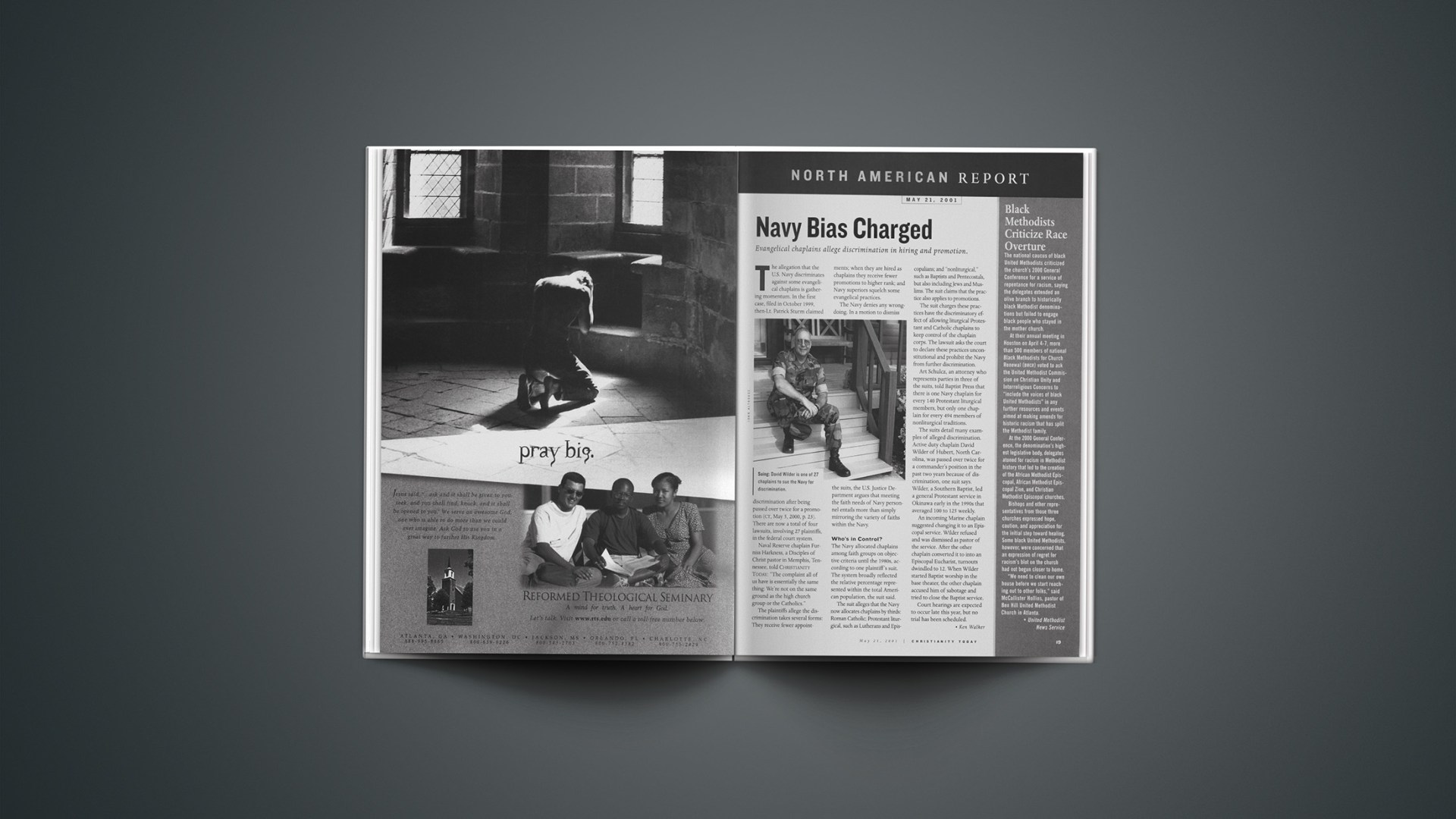Although the Navy moved Sturm, a Pentecostal minister, up a rank to lieutenant commander several months after he filed his suit, U.S. District Judge Thomas Whelan ruled that such administrative relief did not render his case moot.
“If it’s a stacked system, [Sturm] is going to face problems again,” said attorney Dean Broyles, who filed Sturm’s lawsuit. “So will other nonliturgical evangelicals.”
Naval Reserve chaplain Furniss Harkness, a Disciples of Christ pastor in Memphis, Tennessee, told Christianity Today: “The complaint all of us have is essentially the same thing: We’re not on the same ground as the high church group or the Catholics.”
The plaintiffs allege the discrimination takes several forms: They receive fewer chaplaincy appointments; when they are hired as chaplains they receive fewer promotions to higher rank; and Navy superiors squelch some evangelical practices, such as praying in Jesus’ name.
The Navy denies any wrongdoing. In a motion to dismiss the suits, the U.S. Justice Department argues that meeting the faith needs of Navy personnel entails more than simply mirroring the variety of faiths within the Navy. Concerning the complaint by evangelicals that their distinctive worship practices are being squelched, the Justice Department said attempts to promote a general Protestant service on some Navy bases is not discrimination but an effort to augment limited resources. The Justice Department said the plaintiffs are asking for court action that would be inflexible and would tie the hands of Naval officers.
Who’s in Control?The Navy allocated chaplains among faith groups on objective criteria until the 1980s, according to one plaintiff’s suit. The system broadly reflected the relative percentage represented within the total American population, the suit said.
The suit alleges that the Navy now allocates chaplains by thirds: Roman Catholic; Protestant liturgical, such as Lutherans and Episcopalians; and “nonliturgical,” such as Baptists and Pentecostals, but also including Jews and Muslims. The suit claims that the practice also applies to promotions.
The suit charges these practices have the discriminatory effect of allowing liturgical Protestant and Catholic chaplains to keep control of the chaplain corps. The lawsuit asks the court to declare these practices unconstitutional and prohibit the Navy from further discrimination against nonliturgical chaplains in hiring and promotion.
Art Schulcz, an attorney who represents parties in three of the suits, told Baptist Press that the Navy’s discrimination has the effect of infringing on the free exercise of religion among enlisted personnel. He said there is one Navy chaplain for every 140 Protestant liturgical members, but only one chaplain for every 494 members of nonliturgical traditions.
“You’ll see twice as many Baptist Navy personnel as liturgical [personnel], yet they don’t have twice as many chaplains,” Schulcz said. “The ultimate victim in all this is the seaman or Marine who doesn’t get the right to express his First Amendment rights.”
The suits detail many examples of alleged discrimination. For instance, active duty chaplain David Wilder of Hubert, North Carolina, was passed over twice for a commander’s position in the past two years because of discrimination, one suit says. Wilder, a Southern Baptist, led a general Protestant service in Okinawa early in the 1990s that averaged 250 to 275 in weekly attendance.
An incoming Marine chaplain suggested changing it to an Episcopal service. Wilder refused and was dismissed as pastor of the service. After the other chaplain converted it to into an Episcopal Eucharist, turnouts dwindled to 12. When Wilder started Baptist worship in the base theater, which quickly outgrew the Eucharist, the other chaplain accused him of sabotage and tried to close the Baptist service.
Court hearings are expected to occur late this year, but no trial has been scheduled.
Copyright © 2001 Christianity Today. Click for reprint information.
Related Elsewhere
See our earlier coverage of the suit, “Evangelicals File Bias Suit Against Navy” (May 22, 2000), and a lengthier version of the Religion News Service article adapted for the magazine.The Washington Post also covered the lawsuit when it was filed in April 2000.
The Navy Chaplain Corps operates several Web sites, including those for the Navy Chief of Chaplains, the Chaplain Resource Branch, and Chaplain Education.
Other Christianity Today articles about religion in the military include:
The Just-Chaplain Theory | The church need not divorce the military to remain a godly counterculture.(July 27, 2000)
Irreconcilable Differences | The church should divorce the military. (March 6, 2000)
Wiccans Practice on U. S. Bases | Court okays pagan ceremonies. (July 12, 1999)
Military Chaplains Win Speech Case | Military personnel can speak against partial-birth abortion (June 6, 1997)
Military Chaplains Sue Over ‘Project Life’ Ban | Chaplains ordered to “actively avoid” political comment. (December 9, 1999)










